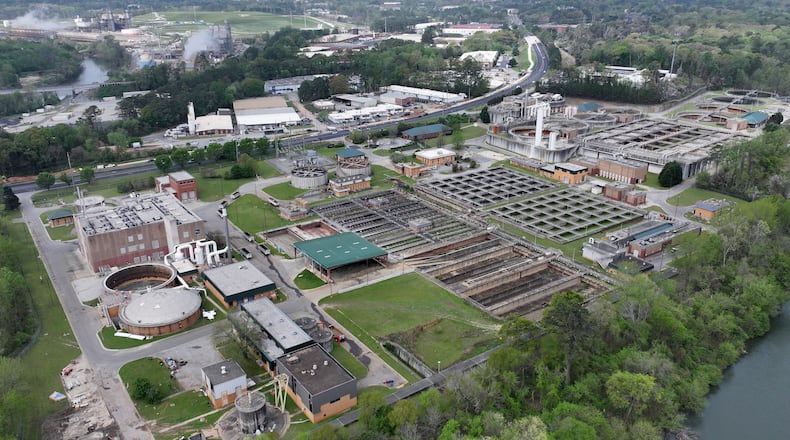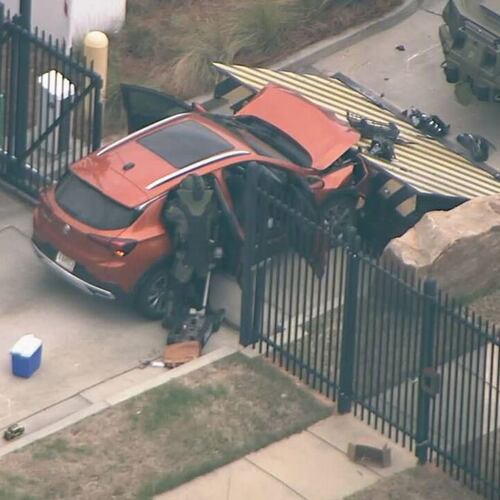Cobb County is proposing to refurbish and restart two incinerators at the R.L. Sutton Water Reclamation Facility for treated sewage sludge known as “biosolids.”
R.L. Sutton, the largest of Cobb’s four wastewater treatment plants, sits along the Chattahoochee River in an industrial area of Vinings. The plant serves eastern Cobb County, including parts of Smyrna and Marietta. Human waste travels through sewer lines to the plant, where it is treated and the resulting biosolids are hauled away to landfills.
Neighbors — some of whom have fought the nearby Sterigenics plant over its emissions for years — are concerned about discharges from the incinerator smoke stacks, particularly mercury, Vinings Village Homeowners Association President Melissa Johnson said.
“We want to hear their plan and what they’re willing to do in terms of monitoring the ongoing output,” Johnson said. “They want the community to be comfortable with what they’re doing, but we’re just not there yet. We need more information.”
The incinerators operated from 1982 until 2016, when federal Clean Air Act standards tightened. Since then, Cobb has contracted a vendor to truck the biosolids away, Cobb County Water System Director Judy Jones said. But state regulators tightened biosolid disposal rules four years ago, after landfills collapsed in Forsyth and Cherokee counties. Jones said Cobb’s biosolids now are being transported out of state at a cost of nearly $15 million this year — quadruple the cost from 2016.
Cobb is weighing three proposals, but estimates refurbishing the incinerators to comply with current environmental standards would cost about $70 million. The estimate includes $15 million worth of upgrades to biosolids processing equipment that will be necessary even if the county doesn’t restart the incinerators, Jones said. Work would begin in 2027 and end in 2029. The investment would pay itself back in 10 years because of reduced landfill costs, the county says.
“We ran incinerators at that plant for 35 years,” Jones said. “We’re not proposing something new.”
The Cobb water department will present the project to Vinings homeowners early next month at the Cochise Club.
Under the proposal, the plant also would take biosolids from the South Cobb Water Reclamation Facility for incineration. The biosolids would be trucked between plants and upgrade costs would include improvements to the receiving area, Jones said.
Cobb’s other two wastewater plants, which are smaller, would continue to send biosolids to landfills, but in the event of a landfill space emergency, the Sutton plant could temporarily receive their waste for incineration, Jones said.
The incinerators use air and hot sand or granular material to apply extreme heat — at least 1,430 degrees Fahrenheit — to biosolids. The process eliminates pathogens, shrinks volume by up to 95% and creates ash, the county says. The incinerators have a unit for mercury removal.
The process is enclosed in a building with two 60-foot chimneys that release exhaust, primarily composed of water vapor, air and carbon dioxide, the county says. Depending on humidity and air temperature, it would appear white or light gray. The exhaust does not have an odor, the county says.
The U.S. Environmental Protection Agency’s standards place limits on mercury emissions from the incinerators. The rules also limit other materials, including lead and carbon monoxide. Emissions will be periodically tested by a third party, according to the county.
“There are definitely concerns in the community because of environmental hazards,” Johnson said. “If something goes wrong with the equipment, it could be a while before it’s identified that there’s a malfunction and something is being blown into the atmosphere that shouldn’t be.”
Restarting the incinerators would reduce emissions from trucks that now haul the waste to landfills and would not impact traffic on Atlanta Road, the county said.
Biosolids also are incinerated just across the river at the R.M. Clayton Water Reclamation Center in the city of Atlanta. Atlanta City Councilman Dustin Hillis, who lives near R.M. Clayton, said he’s never had an issue with odors from the city plant — but smells from Cobb’s plant sometimes travel east.
Atlanta previously used the same biosolids dewatering process as Cobb, but the city changed its procedure, Hillis said. “It generated way too much odor,” he said.
About the Author
Keep Reading
The Latest
Featured




